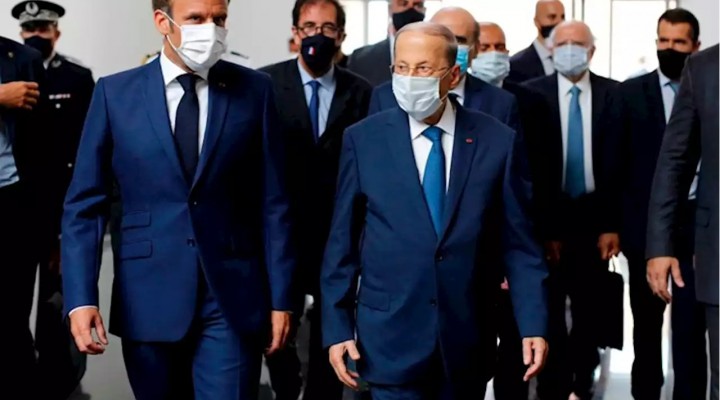Lebanon’s colonial nostalgia

Why have the country’s ever-quarrelling political factions suddenly allowed France to become their arbiter?
Emmanuel Macron’s second visit to Lebanon in a month showed how nostalgic most Lebanese and Arab officials and politicians are for a foreign colonial master to rule them – and how readily they submit to its dictates and commit to their immediate implementation, abandoning any considerations of national sovereignty.
On both of his trips, the French president played the role of big boss and head honcho. He selected a new prime minister – and maybe several members of the cabinet too — and threatened the supposed leaders of Lebanon and its parties and sects, however high and mighty they may be, with sanctions if they fail to form a government within two weeks or impede reforms.
All the country’s parliamentary blocs immediately agreed to appoint Mustafa Adib as prime minister. Their terms and conditions that held up the formation of previous governments for months and on end were summarily dropped, and they all clamoured for the approval of the new prime minister – because he was France’s choice and had Macron’s backing. His competence or otherwise remained a secondary issue.
As most of Lebanon’s political elites are mired in corruption up to their necks, they had good cause to be fearful of sanctions. The billions or millions they have stashed abroad – or smuggled out recently to Swiss or French banks – would be subject to freezing or confiscation.
Lebanon has always been an arena for conflict between rival regional and global powers competing for influence. Macron’s visits (he is due to make a third before the end of the year) affirm that these conflicts are set to escalate in the months and years ahead. In the meantime, the French president appears to have scored an important goal against rival powers, notably Turkey, Iran and the Kingdom of Saudi Arabia.
This French ‘achievement’ could never have been pulled off had Macron not met with Muhammad Raad, the head of Hezbollah’s parliamentary bloc, on an equal footing with the representatives of other groups. That effectively meant lifting the veto on Hezbollah, dropping all preconditions and demands that it disarm, and treating it as an integral part of Lebanon’s social and political fabric.
Macron called for a new political order in Lebanon. That means annulling, in one way or another, the sectarian carve-up arrangements put in place by the Saudi-sponsored 1989 Taif Agreement. But the French president did not reveal what if any kind of alternative order he had in mind. This might transpire in the ‘roadmap’ he promised to unveil, starting with the formation of the new government.
Many of the tensions in Lebanon that preceded Macron’s first visit – including protests and clashes that raised fears of a political vacuum or even another civil war – may have been deliberately contrived to frighten the Lebanese and set the stage for this roadmap. Step-by-step, using both carrots and sticks. The carrot of financial assistance, and the stick of tying that assistance to reforms and threatening sanctions against leading figures in the corrupt political establishment.
Macron went to Lebanon with his focus on his chief rival for influence, Turkish President Recep Tayyip Erdogan. He had sent his deputy, Fuat Aktay, there to offer to rebuild Beirut’s devastated port and the surrounding district and to use the Turkish port of Mersin as an alternative in the interim. He also put forward the loaded proposal of granting Turkish citizenship to all Lebanese of Turkish origin.
A supposedly ‘cold’ war is raging between Macron and Erodgan in the eastern Mediterranean, especially in Libya but also in the waters off Cyprus and Greece which hold huge reserves of natural gas. This rivalry is now moving to Lebanon. It could well result in military clashes given the growing tension and polarisation in the region. The smallest spark could cause ignition.
Erdogan has turned himself into Lebanon’s neighbour. He has deployed military forces in Idlib and northern Syria and has set himself up as overlord of the country’s Sunni community. He may try to do the same with the Sunni sect in Lebanon, which has been more or less abandoned by its traditional Saudi sponsors and is riven with disputes between its political leaders.
Turkish Foreign Minister Mevlut Casivoglu, who accompanied Aktay on his visit to Beirut, summed up the rivalry between Turkey and France by remarking: “wherever a French flag flies, there will be a Turkish flag opposite.” This suggests that many French and Turkish flags will start flying over Lebanon in the near future.
Macron is currently leading a relentless campaign against Turkey, which he deems to be a major adversary. In an interview with the magazine Paris Match, he accused Erdogan of pursuing an expansionist policy based on religious and nationalist principles that threaten Europe and causes destabilisation. His sudden penchant for shuttling to Lebanon can only be seen in that context.
Key questions remain unanswered: Why has the Iranian-led axis kept silent about developments in Lebanon in general and the Franco-Turkish rivalry in particular? Is this a tactical or strategic silence? And with which camp will this alliance end up siding?
We may be provided with answers soon, The current ‘consensus’ among Lebanese political groups is inexplicable and is likely to prove unsustainable.
https://www.raialyoum.com/index.php/lebanons-colonial-nostalgia/
 TheAltWorld
TheAltWorld 
0 thoughts on “Lebanon’s colonial nostalgia”